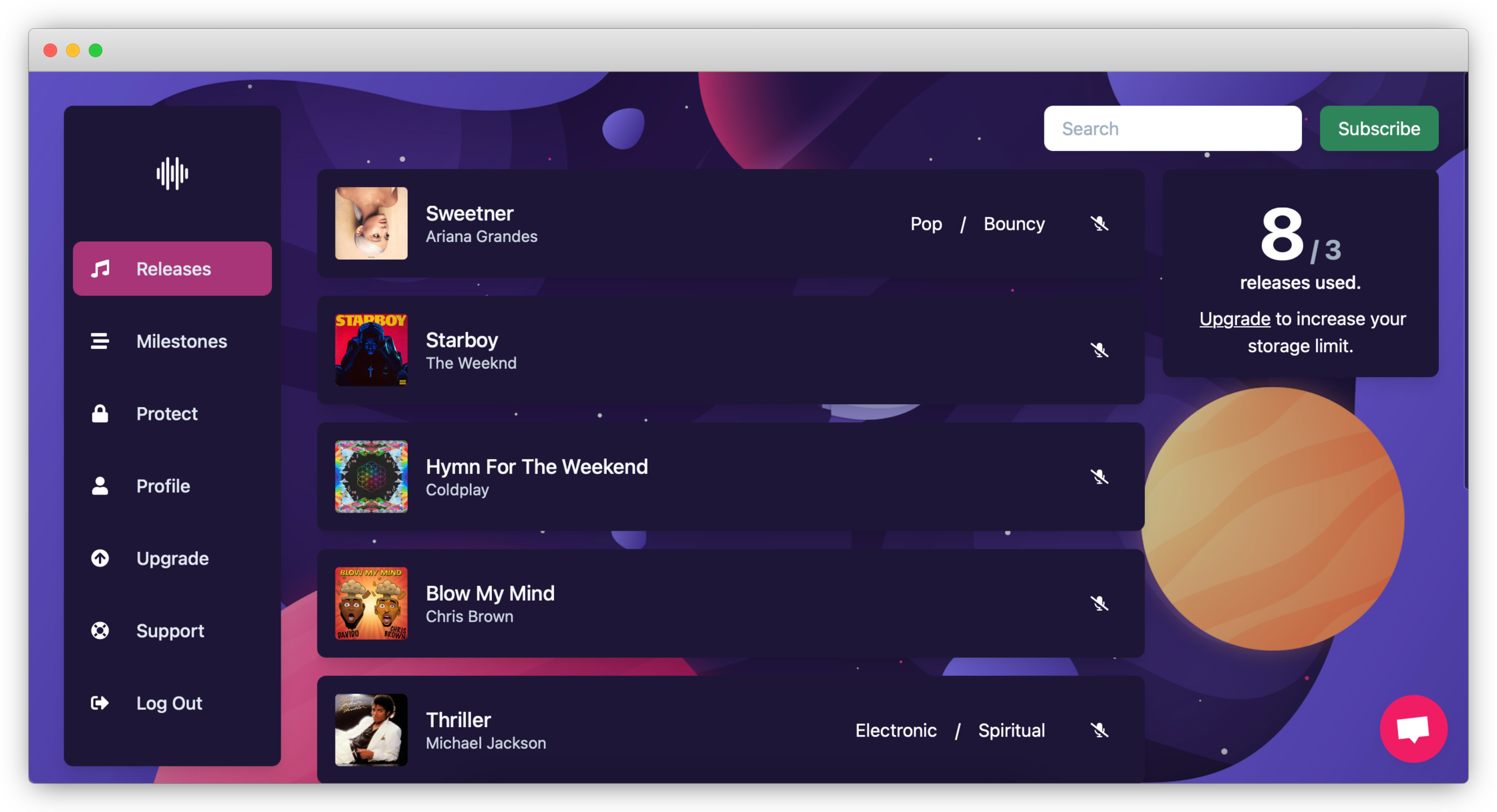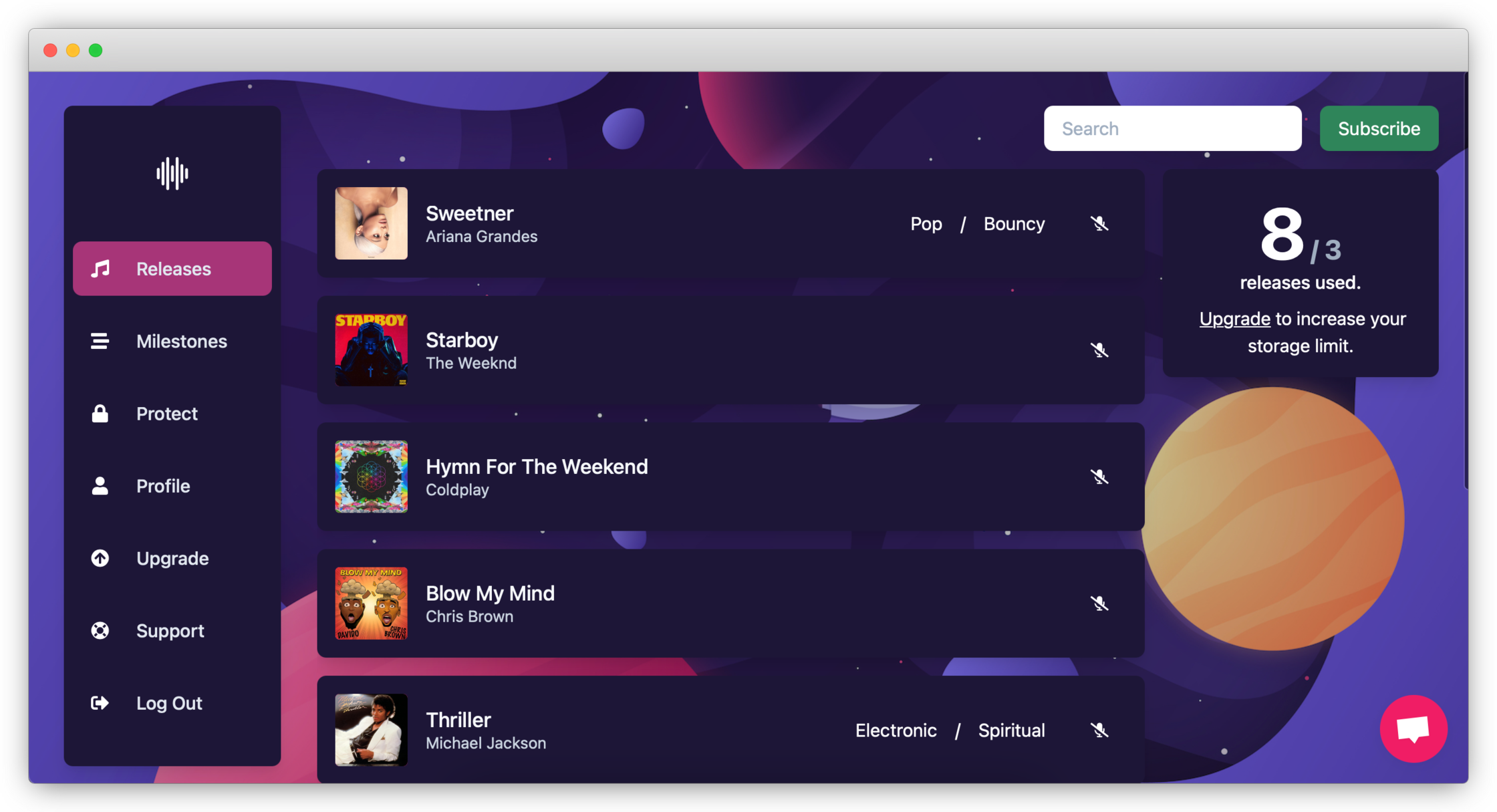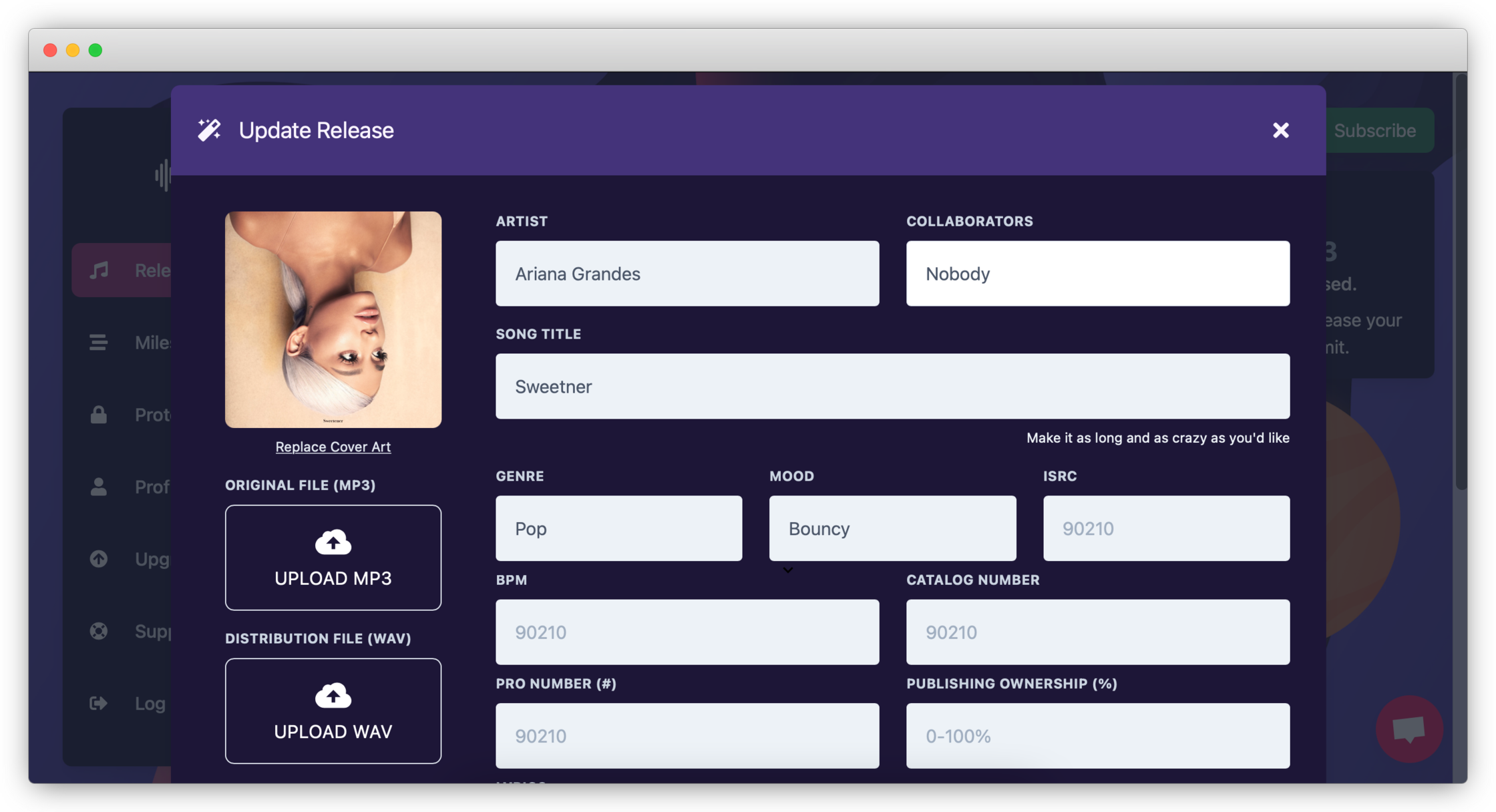Musicspace: Simple Music Catalogue Software.

”For every minute spent organizing, an hour is earned.”
A problem plaguing the music industry, and in particular, independent artists, is disorganization. Artists are taught how to distribute their music, submit their music to promoters, and even produce music. But what about organizing the very information that's most valuable to you as a musician? More importantly, what's the simplest, most affordable music catalogue software out there?
To make things worse, whenever we ask an artist, "how do you organize your music catalogue?", we're met with answers like, "Microsoft Word", "The notes app in my phone", or "On Google Drive".
Such mismanagement only adds insult to injury as your career scales. And, the harsh reality is that an artist's career cannot scale unless they are organized, or have a system that helps them become organized. This is why we're here to help.
Topics we'll cover:
- How to organize your music catalogue In 3 Steps.
- FAQ's about Musicspace
- Glossary of terms used in this article.
1: Why is catalogue organization important?
Below we break down four reasons as to why catalogue organization is important.
👉) Your Career Cannot Grow Properly
It's optimistic to assume that once you put out music, your career will grow linearly. You feel as though you'll maintain things as they come and that it'll all be just fine. Wrong. A lack of organization sets the tone for how well your career grows. As explained in our newsletter about "systems for musicians", unless you have some organization in your career, don't expect it to grow the way you'd like it to. Additionally, if you don't learn to become organized in the small things, your career cannot handle the big things well. For example, if your catalogue isn't well organized now, you'll have a nightmare of a time when asked by licensing agencies for your metadata (we'll get into this later).
👉👉) You'll Lose Out On Revenue
Most new artists have no idea that a lack of organization can cost them hundreds, thousands or even hundreds of thousands of dollars throughout their careers. How? Whenever a brand or movie studio wants to license your music, they have someone called a "Music Supervisor" reach out to you. A music supervisor's role is to collect information about your song (known as "metadata") to license your song for their movie, commercial or TV show. Unless you have an organized record of your music catalogue (including in-depth details), you could lose out on that licensing deal. This is because music supervisors don't want the risk of a Copyright battle if they license your music without the correct information. Information such as: Who owns what percentage of the masters? Or, do you have split sheets to show proof of such ownership portions?
👉👉👉) It Reduces Mental + Legal Pressure
According to studies, there are distinct links between mental/physical health and a lack of organization. It doesn't take a rocket scientist to understand that not organizing your most valuable assets will come back to haunt you someday.
The goal as a musician is to become someone who can get things done efficiently with your data. Need metadata for a licensing deal? Boom, as an organized musician, you'd have that ready. Need a document proving your track ownership of a song you made with a friend? Boom! As an organized musician, you'd avoid the legal troubles of not having that document organized and at the ready.
See how your metadata makes life easier for you when it's organized? Suddenly you go from having to "track down" metadata to having it at the ready whenever it's needed.
These are several reasons why organizing your music catalogue is so important. Without having things in order, you open yourself up to more chaos than you know how to deal with. So why not make your life a little less stressful?
2: How to get organized with simple Music Catalogue Software.
It's tough enough learning how to promote yourself, grow your brand and network as a musician, which is why music catalogue organization shouldn't be "another" pressure. This is why we created Musicspace. A simple & affordable music catalogue organization and protection platform for artists, artist management companies, and record labels.
How it works
1️⃣ Step One:
Head over to Musicspace.io and sign up. You can subscribe to any of our plans starting from $3.99/month to organize and store up to 10 tracks. Once signed up and logged in, you'll see your dashboard:

2️⃣ Step Two:
From your dashboard, click the "Add Release" button to begin uploading/adding your track files and metadata. Here's an image to show you what that screen looks like.

Within each release you add, you can store the following metadata/information:
- Track files (WAV/MP3's)
- Cover arts (JPG's)
- Song Titles
- Lyrics
- Collaborator information
- Genres & Moods
- BPM's
- PRO Numbers
- Track ownership percentages
- ISRC Codes
- Catalogue Numbers
- Split-sheet files (PDF's).
- Track notes (anything you want)
- And more!
Once done, just hit save! :)

3️⃣ Step Three:
Musicspace doesn't just stop at catalogue organization. We also provide two extra tools (available on any paid plan) that further help artists.
🔐 Copyright Protection
Last year we teamed up with a worldwide Copyright lawyer to create Musicspace Protect, our built-in Copyright protection tool that allows you to instantly protect your song files, lyrics and images. This is an optional extra tool, and is only $2.50 per work you protect! See it in action in this tutorial.
✍️ Milestone Tracking
If I were to ask you, "What are the three best memories of your career in 2007?", how would you answer that? - I'm guessing you might have a hard time remembering things from back in 07'. That's why we created milestones. Milestones is a simple way to track your career milestones, memories and achievements in a beautiful timeline view. Never again will you have to miss out on important days that helped make you the artist you! See it in action with this tutorial.
🧠 Project Management (Coming soon).
Since our goal at Musicspace is to reduce your stress, we thought we'd make project/task management simple. In March (2020), we'll be releasing our "Spaces" feature. It'll be a minimalist way to track your to-dos and important tasks, all from within your dashboard.
You'll be able to create as many as you like, and set "due dates" so you never miss important tasks!
3: FAQ's About Musicspace
Below are some of our most frequently asked questions, as well as frequent objections. We answer them all below! :)
Q1: How much does Musicspace cost?
A1: Musicspace starts at $3.99/month to organize up to 10 tracks. Or pricing grows as follows: $5.99/month to organize up to 30 tracks, $12.99 for up to 100 tracks, and $29.99 for unlimited tracks.
Q2: Is It Worth It?
If growing your career is serious to you, then yes, organizing your most valuable assets is more than worth it. Musicspace is the most affordable music catalog management platform out there.
Q3: How many artist’s use Musicspace?
A3: Currently, over 500 artists, management agencies and labels use Musicspace to organize and protect their music.
Q4: Can I Cancel Anytime?
A4: Absolutely. Musicspace never ties you down to a contract, and we don’t ask a million questions before you leave, either.
Q5: I store information on my distributor though
A5: Musicspace isn’t a competitor to distributors, however, in response to this common objection, Musicspace allows you to store more detailed metadata in one centralized place - Not mixed up between distributors, publishing administrators, labels, etc. Plus, Musicspace provides more services such as Copyright Protection, milestones tracking and project management.
Q6: Can I speak with someone first?
A6: We’d be happy to chat! head over to Musicspace.io and click the little “Live chat” button to chat with us. Or, email us at: Support@Musicspace.io
4: Glossary of terms used in this article
Music Metadata:
Refers to information related to a song, e.g. Lyrics, cover arts, track files, genres, etc.
Musicspace:
Affordable music catalogue software for musicians, record labels and management agencies.
Music Supervisor:
A person responsible for the sourcing and licensing of music for TV & film projects.
Split-sheet
A document that outlines the ownership percentage of a song between one or more people.